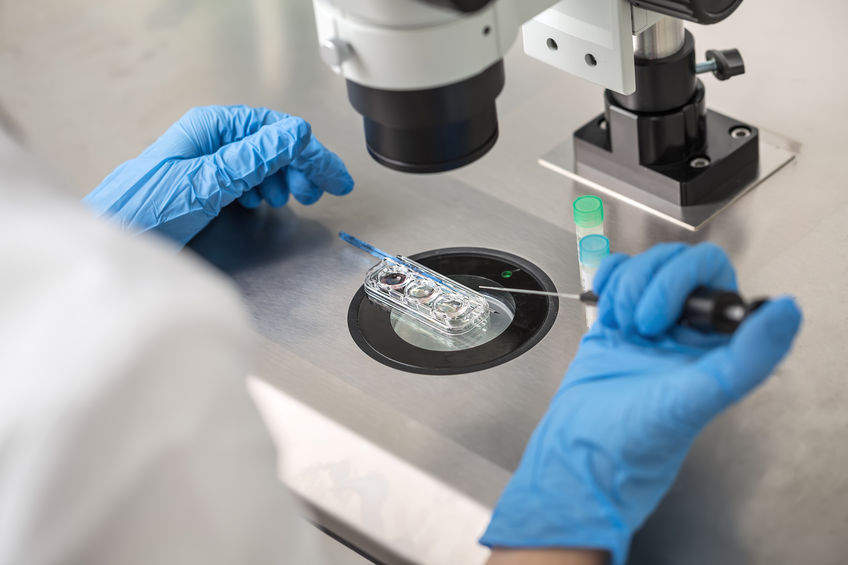Historically, embryo transfer after IVF or ICSI was done on Day 2 or Day 3 after egg collection. However, developments in IVF laboratory technology now allow us to culture embryos for five or six days. This gives the embryos additional chances to demonstrate their developmental potential. Some embryos cease to develop (arrest) before day 5/6. This ‘natural selection’ enables the embryologist to discover and pick the best embryo/embryos for transfer.
Advantages of Blastocyst Culture
Blastocyst culture requires optimal laboratory conditions. Approximately 45% of fertilized eggs reach the blastocyst stage.
Because only the most competent embryos mature to the blastocyst stage, allowing embryos to grow and develop in the laboratory until they reach the blastocyst stage allows for the selection of the most capable embryo/s for embryo transfer.
In addition, in a natural pregnancy, the embryo takes around five days after fertilization to enter the womb, where it subsequently implants. On this day, the uterine lining is very receptive. As a result, blastocyst transfer is more physiological.
Advantages of Blastocyst Transfer
- Improved Pregnancy Rates: Blastocysts have a higher potential for implantation compared to earlier-stage embryos, leading to improved pregnancy rates per transfer.
- Reduced Risk of Multiple Pregnancies: By transferring fewer blastocysts while maintaining high success rates, the risk of multiple pregnancies is minimized.
- Enhanced Embryo Selection: Blastocyst development indicates embryo viability and quality, allowing for more accurate selection of embryos with the highest chance of success.
- Increased Live Birth Rates: Studies have shown that blastocyst transfer is associated with higher live birth rates compared to earlier-stage embryo transfer methods.
At Sapling IVF Centre, we specialize in blastocyst transfer as part of our comprehensive range of fertility treatments. Our experienced team utilizes state-of-the-art technology and personalized care to optimize outcomes for our patients.
Blastocyst culturing is recommended for:
- For patients with multiple failed IVF: Performing a blastocyst culture on a patient with a history of failed IVF with day2/3 embryo transfer, can yield more information related to the growth of the embryos and aid in improving pregnancy rate
- To eliminate multiple pregnancies: Blastocyst culture allows the possibility of transferring the single best embryo and thereby reducing the chance of multiple pregnancy.
Blastocyst transfer is recommended for:
- Younger Patients: Blastocyst transfer is often preferred for younger patients with a higher number of good-quality embryos. The extended culture to the blastocyst stage allows for better embryo selection, increasing the chances of successful implantation and pregnancy.
- Previous IVF Failures: Patients who have experienced failed IVF cycles with earlier-stage embryo transfers may benefit from blastocyst transfer. The increased maturity of blastocysts enhances their potential for implantation, potentially improving success rates in subsequent cycles.
- Recurrent Pregnancy Loss: Individuals or couples with a history of recurrent pregnancy loss may benefit from blastocyst transfer. The improved embryo selection and higher implantation rates associated with blastocyst transfer may reduce the risk of miscarriage and increase the likelihood of a successful pregnancy.
- Limited Embryo Availability: Blastocyst transfer may be recommended for patients with a limited number of available embryos. By allowing embryos to develop to a more advanced stage before transfer, blastocyst transfer maximizes the chances of selecting the highest quality embryos for transfer, optimizing the chances of success.
- Preimplantation Genetic Testing: Patients undergoing preimplantation genetic testing (PGT) may opt for blastocyst transfer to allow sufficient time for embryo biopsy and genetic analysis. Blastocyst-stage embryos provide a larger and more representative sample for genetic testing, improving the accuracy of results.
Ready to take the next step towards building your family? Contact Sapling IVF Clinic today to learn more about blastocyst culture and transfer. Our friendly and experienced team is here to answer any questions and guide you through the process. Book your consultation now and let us help you on your journey to parenthood!


